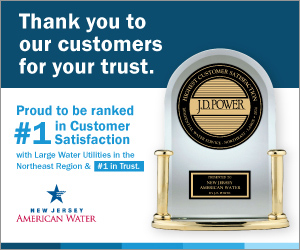Sierra Club: DEP Becomes Roadblock for DQWI and Clean Water
DEP Becomes Roadblock for DQWI and Clean Water
Lawrencville, NJ- Today the Drinking Water Quality Institute (DWQI) held a meeting to discuss previous DWQI MCL Recommendations on PFNA and1,2,3-TCP – NJDEP MCL rule adoption and implementation b. PFOA and PFOS – status of DWQI recommendations.
“The DWQI is doing their job and using the best science and technology in the country to protect our water. The DEP, however, is standing in their way. The department has delayed making stricter standards for dangerous chemicals in our water like PFOS and PFOAs. What is even worse is that DEP adopted weaker standards for 1,2,3-TCP at 30ppt even though the science shows the standards should be at 5ppt,” said Jeff Tittel, Director of the New Jersey Sierra Club. “We must be proactive in setting stronger standards for dangerous chemicals in our drinking water like 1,2,3-Trichloropropane (TCP), PFOS, and 1,4-Dioxane. New Jersey especially need to make our own standards because we can’t trust the federal government to make stronger enough ones to protect our communities.”
DWQI Standards for PFNA
The Drinking Water Quality Institute has already made recommendations for PFNAs for the DEP to adopt at 13ppt. New York has come out with a PFOA standard of 10ppm, New Jersey’s standard is at 14ppm. The federal Environmental Protection Agency detected PFOA in levels of at least 20 parts per billion in 14 drinking water systems, including Ridgewood Water, Fair Lawn, Garfield, Wallington and Hawthorne.
“The Drinking Water Quality Institute, 21 months ago, made recommendations for PFOS and PFOAs. The institute had the science behind them and the best technology when they made that standard. They found that the water can be treated and, in a cost, effective manner. And yet, The Murphy Administration is still sitting on their hands and we are still waiting for the DEP to adopt those standards. As long as DEP keeps delaying, we are drinking water we should not be drinking. PFOS are found throughout our state. Last year, PFOS was found at the Joint Base McGuire-Dix-Lakehurst, Atlantic City, Paulsboro, and Ridgewood. In Salem and Gloucester County, PFOs found near the Solvay site were seven times over standard,” said Tittel.
Repeated exposure to PFOS can lead to development defects in children and pregnant women, liver and kidney problems, and even tumors. We have even found PFOS in our fish, even from the most pristine areas
“The standard includes cleaning up toxic sites which means toxic site will not get cleaned up and spread into the environment. Repeated exposure to PFOS can lead to development defects in children and pregnant women, liver and kidney problems, and even tumors. We have even found PFOS in our fish, even from the most pristine areas,” said Tittel. “New York came out with a standard to protect their drink water, why haven’t the DEP?
I,2,3-TCP
In May, the Drinking Water Quality Institute (DWQI) met to discuss various toxins in our drinking water including PFOs and 1,2,3,-TCP. Their meeting agenda included Comment/Response on Draft Subcommittee Reports on PFOS. The Senate Environment and Energy Committee also held S74 (Singleton) because the DEP opposed the level of 15 ppt and instead recommend 30 ppt. The bill requires DEP to establish maximum contaminant level for 1,2,3-trichloropropane in drinking water.
“Last spring the DWQI came out with standard for 1,2,3-TCP at 5ppt. This was based on the latest science however DEP in September adopted a weaker standard at 30ppt. New Jersey requires standard of a cancer risk for 1 in a million but DEP adopted a standard that is 6 times weaker. The DEP is saying they’re using a weaker standard of 30ppt because our lab’s ‘don’t have the ability’ to detect the PQL. This is false because any good lab can test for that level and California has a standard of 5ppt,” said Tittel.
In September, DEP an MCL for 1,2,3-trichloropropane (1,2,3-TCP) of 0.030 µg/l. 1,2,3-Trichloropropane (TCP). DEP has set an PQL for TCP instead of an MCL standard. This standard was proposed under the Christie Administration. Based on this standard, the risk factor for cancer is 6x more using PQL rather than MCL. The PQL is a practical quantity level that is not based on health-based standard. Using a different standard will also set up a conflict between the DEP and DWQI.
1,2,3,-TCP is both mutagenic and genotoxic and is found at dangerously high concentrations at Moorestown, Burlington County.
The 1,2,3-TCP recommendation for 5ppt was on the agenda for today but when asked about it, the DEP said they want to discuss that off at committee. This is their way of trying to delay or bury it. It wasn’t the DEP scientists at the meeting who blocked the rule, it was the leadership at DEP. We don’t know when the rule can be adopted, it could take more than a year. By not adopting the standard, we are putting people at risk. DEP must move forward on a stricter standard especially since it includes cleaning up drinking water and contaminated sites. By adopting a weaker standard, DEP is putting people at risk, especially where this toxin is prevalent such as Moorestown and Burlington County,” said Tittel.
1,4- Dioxane
DWQI will recommended a standard for 1,4 Dioxane at 1ppt at their next meeting. 1,4-Dioxane has been found in 119 water systems throughout New Jersey. The groundwater at the Ford Superfund Site in Ringwood near the Wanaque Reservoir is contaminated with 1,4 Dioxane with levels at 4 micrograms. The report by the North Jersey District Water Supply Commission says that the 1,4 dioxane found in the groundwater at the Superfund Site needs to be treated to ensure it doesn’t migrate to the reservoir, which is just a mile away. This could contaminate the drinking water that serves as many as 3.5 million people.
“1,4-dioxane is a cancer-causing substance and it’s still present throughout New Jersey in areas like Chester, Fair Lawn, Pompton Lakes, Pennsauken, and Gloucester. The Ford Superfund Site in Ringwood has groundwater with levels of 1,4-dioxane that is 4 times the standard that DWQI will recommend. The site is right next to the Wanaque Reservoir and could contaminate drinking water for millions of people. Cancer could occur in one person out of 1 million exposed to 0.35 milligrams per liter of the chemical over a lifetime. The federal government has yet to develop a national standard for the chemical in water supplies which is why it is critical for DWQI to recommend a strict standard for 1,4-Dioxane and the DEP to adopt it,” said Tittel. “It looks like the DWQI will adopt a standard for 1,4-Dioxane in the spring, but will DEP stand in their way again? New York has already come out with a standard at 1ppt.”
We need the strictest standards for these dangerous materials and we need them to be as strong as possible based on strict science. The longer they wait, the more people are put in danger. It is critical for the DEP to act quickly on theses water standards.
“It is reckless and shameful that the DEP will not reopen and adopt stricter standards for 1,2,3-TCP. 1,2,3-TCP is a known carcinogen that impacts public health and we need to keep it out of our drinking water. We need legislation that would require DEP to decide on a water standard in 90 days. We are putting our heath and the environment at risk every day we have weaker standards. DEP must move forward on setting the strictest standards for contaminates in our water, it is too important for our health and the environment,” said Jeff Tittel, Director of the New Jersey Sierra Club. “We waited for 5 years for Christie to allow the DWQI to meet and set new standards. Now with the new administration, we expected that the 17 different hazardous chemicals would get stricter standards. Here we are a year in the Murphy Administration and they have failed to propose one new standard. It’s time that DEP adopt stricter standards to protect our health and the environment.”








